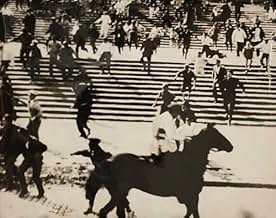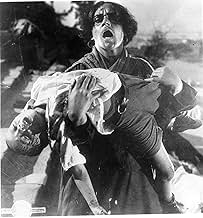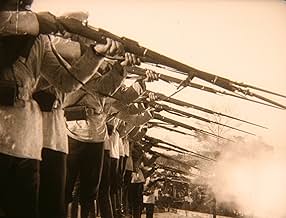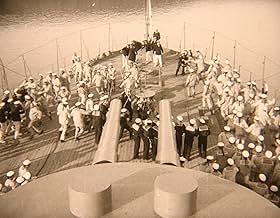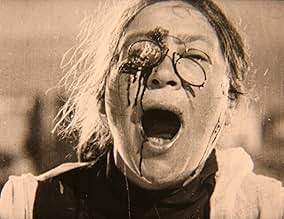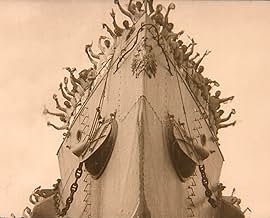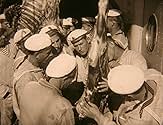IMDb RATING
7.9/10
64K
YOUR RATING
In the midst of the Russian Revolution of 1905, the crew of the battleship Potemkin mutiny against the brutal, tyrannical regime of the vessel's officers. The resulting street demonstration ... Read allIn the midst of the Russian Revolution of 1905, the crew of the battleship Potemkin mutiny against the brutal, tyrannical regime of the vessel's officers. The resulting street demonstration in Odessa brings on a police massacre.In the midst of the Russian Revolution of 1905, the crew of the battleship Potemkin mutiny against the brutal, tyrannical regime of the vessel's officers. The resulting street demonstration in Odessa brings on a police massacre.
- Awards
- 1 win total
Ivan Bobrov
- Young Sailor Flogged While Sleeping
- (as I. Bobrov)
Nina Poltavtseva
- Woman With Pince-nez
- (as N. Poltavtseva)
Iona Biy-Brodskiy
- Student
- (as Brodsky)
Sergei Eisenstein
- Odessa Citizen
- (as Sergei M. Eisenstein)
Andrey Fayt
- Recruit
- (as A. Fait)
Summary
Reviewers say 'Battleship Potemkin' is acclaimed for its pioneering montage and editing, significantly impacting cinema. The 1905 Russian Revolution portrayal, especially the Odessa Steps scene, is lauded for its potent visuals and emotional resonance. Many praise its technical innovations and contribution to filmmaking. However, some criticize its political propaganda and shallow character development. Nonetheless, 'Battleship Potemkin' is widely recognized as a cinematic masterpiece and a vital historical film.
Featured reviews
This classic is filled with vivid images that stay in your mind after you have watched it, and there is a lot to appreciate in the way that the key scenes were set up and photographed. The visuals are so impressive that the movie's imperfections are usually not so noticeable, and they don't keep it from being a memorable film.
The movie certainly deserves the praise that it gets both for the influence that it has had, and for some ideas that for the time were most creative. The famed 'Odessa Steps' sequence alone demonstrates both fine technical skill and a keen awareness of how to drive home an image to an audience. It deserves to be one of cinema's best remembered sequences. Some of the other scenes also demonstrate, to a lesser degree, the same kind of skill.
It says a lot for how effective all of the visuals are that so many viewers think so highly of "Battleship Potemkin" despite a story that is sometimes heavy-handed, and despite characters and acting that are both rather thin. These features might simply stem from the collectivist philosophy that lies behind the story, and they are obscured most of the time by Eisenstein's unsurpassed ability to present pictures that viewers will not forget.
Despite the flaws, this is a movie that most fans of silent films, and anyone interested in the history of movies, will want to see. There's nothing else in its era that's quite like it.
The movie certainly deserves the praise that it gets both for the influence that it has had, and for some ideas that for the time were most creative. The famed 'Odessa Steps' sequence alone demonstrates both fine technical skill and a keen awareness of how to drive home an image to an audience. It deserves to be one of cinema's best remembered sequences. Some of the other scenes also demonstrate, to a lesser degree, the same kind of skill.
It says a lot for how effective all of the visuals are that so many viewers think so highly of "Battleship Potemkin" despite a story that is sometimes heavy-handed, and despite characters and acting that are both rather thin. These features might simply stem from the collectivist philosophy that lies behind the story, and they are obscured most of the time by Eisenstein's unsurpassed ability to present pictures that viewers will not forget.
Despite the flaws, this is a movie that most fans of silent films, and anyone interested in the history of movies, will want to see. There's nothing else in its era that's quite like it.
A milestone in cinematic history, 'Bronenosets Potyomkin' is one of the handful of great films out there that richly deserves to be called a classic. It was the picture that made Sergei M. Eisenstein a figurehead of film-making at the time. And today, it is still remembered as the wonderful piece of cinema it always has been.
'Potyomkin' is a film that NEEDS to be seen as one entity, not to be picked at. Don't just watch those clip shows where they only present the 'Odessa steps' sequence and then move on to 'Citizen Kane' or 'The Godfather', see it all in it's glorious 75-minute running time to really understand and enjoy it. Don't expect every infinitesimal detail to be perfect though, I mean the acting of the '20s silent era makes 'Scooby Doo' look like a master of understated realism, certain plot points may seem illogical and some of the battle sequences look dated, but it is still an immensely enjoyable movie.
The most memorable moments in the film are the mutiny on the battleship, Vakulinchuk's body falling off the ship, the sailor under the tent at the end of the pier, the mother holding her dead child, the baby carriage on the Odessa steps and the lion rising up to roar as further carnage ensues. For each new pair of eyes that look upon it, 'The Battleship Potemkin' comes alive once again.
'Potyomkin' is a film that NEEDS to be seen as one entity, not to be picked at. Don't just watch those clip shows where they only present the 'Odessa steps' sequence and then move on to 'Citizen Kane' or 'The Godfather', see it all in it's glorious 75-minute running time to really understand and enjoy it. Don't expect every infinitesimal detail to be perfect though, I mean the acting of the '20s silent era makes 'Scooby Doo' look like a master of understated realism, certain plot points may seem illogical and some of the battle sequences look dated, but it is still an immensely enjoyable movie.
The most memorable moments in the film are the mutiny on the battleship, Vakulinchuk's body falling off the ship, the sailor under the tent at the end of the pier, the mother holding her dead child, the baby carriage on the Odessa steps and the lion rising up to roar as further carnage ensues. For each new pair of eyes that look upon it, 'The Battleship Potemkin' comes alive once again.
Sergei Eisenstein's silent masterpiece is a very influential and possibly the most famous landmark film ever made. Many, many memorable scenes, including one of the best and most powerful scenes in film history, the massacre on the Odessa steps. No film in our time has captured such power and amazement from one sequence. Along from being a landmark in film history, it also has a strong message on brotherhood and power hungry leaders. This one has stood the test of time and will for ever more.
I don't recommend that you see this as a 'landmark' in film; don't merely pass through to say you did, or because it's a travelled destination for most people. Instead, come to this with fresh eyes if you can. Rarely since has a film - and film tradition - been so deeply centered within its worldview, rarely indeed is a film made of the very fabric of the world it gives voice to. Most films these days are built at random, or from random spare parts.
Eisenstein had already made a more successful film before this, more reflexively about the seeing eye. So, even though there is a more rip-roaring story here, you may have to struggle a bit with how faceless appears this world to us, these days so accustomed to the paradigm of the individual hero. But Eisenstein was an architect - literally, as well as in film - and so space matters, our relationship with space through motion matters.
In other words; this may have been preserved to us as a museum piece, which is an indictment of our own understanding of cinema as coming down to us by the books and lists of assorted institutions, but at the time it was part of the most deeply revolutionary film school, one that rigged trains as movie studios and sent them scurrying the countryside to film the people and show them to themselves. I mean, here was a man - Eisenstein - who studied Japanese ideograms to understand synthesized image; who discovered that editing to the beats of the human heart affected more, true or false it shows the desire to both know and reach out.
Our cinematic ideas have mostly regressed into mechanical reproduction since the time when these things were first engineered. Oh, there's plenty of Eisenstein every time you open the TV, but none of it is knowing. It's merely a matter of going-through-the-motions, without the blueprint anymore.
So, look at how crowds are orchestrally conducted through stark geometries, how Eisenstein dissects cinematic space with even a stationary camera. But this type of cinema meant to agitate the people, was never about a thought, it was about an action.
And so with this one. There is the one hero who, although dead, calls out to the people. They rush to him, like ships around their harbor. So on board the ship there is valiant effort for brotherhood and justice, inspired revolution; portside is the motherland, cheering the effort with aplomb. And in the end there is the hero ship, itself filled with heroes, now passing through a sea corridor lined with brother ships, all cheering the one. You can imagine the people cheering at the cinema, who had been there to cheer the real thing years ago.
And when I say 'the real thing' I mean the revolution 8 years before; the Potemkin event depicted here was purely fictional. Yet by the famous steps at Odessa is erected a monument to the fictional sailors, what better example of cinema shaping reality?
So yes, it is a revolutionary film. We may be inclined to make fun of the notions, or worse yet dismiss off-hand because of hindsight knowledge. But this was a film celebrating a time when the world seemed like it could be new again. Then came Stalin and, ironically, vanished all these filmmakers that sung the paeans.
Eisenstein had already made a more successful film before this, more reflexively about the seeing eye. So, even though there is a more rip-roaring story here, you may have to struggle a bit with how faceless appears this world to us, these days so accustomed to the paradigm of the individual hero. But Eisenstein was an architect - literally, as well as in film - and so space matters, our relationship with space through motion matters.
In other words; this may have been preserved to us as a museum piece, which is an indictment of our own understanding of cinema as coming down to us by the books and lists of assorted institutions, but at the time it was part of the most deeply revolutionary film school, one that rigged trains as movie studios and sent them scurrying the countryside to film the people and show them to themselves. I mean, here was a man - Eisenstein - who studied Japanese ideograms to understand synthesized image; who discovered that editing to the beats of the human heart affected more, true or false it shows the desire to both know and reach out.
Our cinematic ideas have mostly regressed into mechanical reproduction since the time when these things were first engineered. Oh, there's plenty of Eisenstein every time you open the TV, but none of it is knowing. It's merely a matter of going-through-the-motions, without the blueprint anymore.
So, look at how crowds are orchestrally conducted through stark geometries, how Eisenstein dissects cinematic space with even a stationary camera. But this type of cinema meant to agitate the people, was never about a thought, it was about an action.
And so with this one. There is the one hero who, although dead, calls out to the people. They rush to him, like ships around their harbor. So on board the ship there is valiant effort for brotherhood and justice, inspired revolution; portside is the motherland, cheering the effort with aplomb. And in the end there is the hero ship, itself filled with heroes, now passing through a sea corridor lined with brother ships, all cheering the one. You can imagine the people cheering at the cinema, who had been there to cheer the real thing years ago.
And when I say 'the real thing' I mean the revolution 8 years before; the Potemkin event depicted here was purely fictional. Yet by the famous steps at Odessa is erected a monument to the fictional sailors, what better example of cinema shaping reality?
So yes, it is a revolutionary film. We may be inclined to make fun of the notions, or worse yet dismiss off-hand because of hindsight knowledge. But this was a film celebrating a time when the world seemed like it could be new again. Then came Stalin and, ironically, vanished all these filmmakers that sung the paeans.
With workers striking in Russia, the crew of the battleship Potemkin feel a certain kinship for the plight of their brothers. When they are served rotting, maggot infested meat some of the crew object, only to find themselves singled out and placed in front of a firing squad. With the marines seconds away from firing the deadly shots, ordinary seaman Grigory Vakulinchuk steps into the breach and intervenes to save the men by appealing to the firing squad to ignore their orders. When the officers take their revenge and kill Vakulinchuk, all are bonded together in the struggle; a bond that reaches to the city of Odessa where the rebellion grows, leading to a bloody and historic series of events.
It is hard to imagine that anybody who has seen quite a few films in the past few decades would be unaware of this film, but it is perhaps understandable that fewer have had the opportunity to actually sit down and watch. I had never seen this film before but had seen countless references to it in other films and therefore considering it an important film to at least see once. The story is based on real events and this only serves to make it more interesting but even without this context it is still an engaging story. The story doesn't have much in the way of characters but it still brings out the brutality and injustice of events and it is in this that it hooked me surprisingly violent (implied more than modern gore) it demonising the actions and shows innocents falling at all sides in key scenes. The version I saw apparently had the original score (I'm not being snobby modern rescores could be better for all I know) and I felt it worked very well to match and improve the film's mood; dramatic, gentle or exciting, it all works very well.
The feel of the film was a surprise to me because it stood up very well viewed with my modern eyes. At one or two points the model work was very clearly model work but mostly the film is technically impressive. The masses of extras, use of ships and cities and just the way it captures such well organised chaos are all very impressive and would be even done today. What is more impressive with time though is how the film has a very strong and very clean style to it it is not as gritty and flat as many silent films of the period that I have seen; instead it is very crisp and feels very, very professional. Of course watching it in 2004 gives me the benefit of hindsight where I can look back over many films that have referenced the images or directors who have mentioned the film in interviews; but even without this 20:20 vision it is still possible to see how well done the film is and to note how memorable much of it is the steps and the firing squad scenes are two very impressive moments that are very memorable. The only real thing that might bug modern audiences is the acting; it isn't bad but silent acting is very different from acting with sound. Here the actors all over act and rely on their bodies to do much of their delivery word cards just don't do the emotional job so they have to make extra effort to deliver this.
Overall this is a classic film that has influenced many modern directors. The story is engaging and well worth hearing; the directing is crisp and professional, producing many scenes that linger in the memory; the music works to deliver the emotional edge that modern audiences would normally rely on acting and dialogue to deliver and the whole film is over all too quickly! An essential piece of cinema for those that claim to love the media but also a cracking good film in its own right.
It is hard to imagine that anybody who has seen quite a few films in the past few decades would be unaware of this film, but it is perhaps understandable that fewer have had the opportunity to actually sit down and watch. I had never seen this film before but had seen countless references to it in other films and therefore considering it an important film to at least see once. The story is based on real events and this only serves to make it more interesting but even without this context it is still an engaging story. The story doesn't have much in the way of characters but it still brings out the brutality and injustice of events and it is in this that it hooked me surprisingly violent (implied more than modern gore) it demonising the actions and shows innocents falling at all sides in key scenes. The version I saw apparently had the original score (I'm not being snobby modern rescores could be better for all I know) and I felt it worked very well to match and improve the film's mood; dramatic, gentle or exciting, it all works very well.
The feel of the film was a surprise to me because it stood up very well viewed with my modern eyes. At one or two points the model work was very clearly model work but mostly the film is technically impressive. The masses of extras, use of ships and cities and just the way it captures such well organised chaos are all very impressive and would be even done today. What is more impressive with time though is how the film has a very strong and very clean style to it it is not as gritty and flat as many silent films of the period that I have seen; instead it is very crisp and feels very, very professional. Of course watching it in 2004 gives me the benefit of hindsight where I can look back over many films that have referenced the images or directors who have mentioned the film in interviews; but even without this 20:20 vision it is still possible to see how well done the film is and to note how memorable much of it is the steps and the firing squad scenes are two very impressive moments that are very memorable. The only real thing that might bug modern audiences is the acting; it isn't bad but silent acting is very different from acting with sound. Here the actors all over act and rely on their bodies to do much of their delivery word cards just don't do the emotional job so they have to make extra effort to deliver this.
Overall this is a classic film that has influenced many modern directors. The story is engaging and well worth hearing; the directing is crisp and professional, producing many scenes that linger in the memory; the music works to deliver the emotional edge that modern audiences would normally rely on acting and dialogue to deliver and the whole film is over all too quickly! An essential piece of cinema for those that claim to love the media but also a cracking good film in its own right.
Did you know
- TriviaThe film censorship boards of several countries felt this movie would spread communism. France imposed a ban after a brief run in 1925; it lifted it in 1953 after the death of Russian leader Joseph Stalin. The UK banned it until 1954.
- GoofsIn the Imperial squadron near the end of the film, there are close-ups of triple gun turrets of Gangut-class dreadnought. It possibly was made this way to show the power of Imperial fleet, but battleships of 1905 were much smaller pre-dreadnoughts, with twin turrets only, just like "Potemkin". "Ganguts" entered service in 1914.
- Alternate versionsSergei Eisenstein's premiere version opened with an unattributed quote from Leon Trotsky's "1905": The spirit of mutiny swept the land. A tremendous, mysterious process was taking place in countless hearts: the individual personality became dissolved in the mass, and the mass itself became dissolved in the revolutionary impetus. This quote was removed by Soviet censors in 1934, and replaced by a quotation from V.I. Lenin's "Revolutionary Days": Revolution is war. Of all the wars known in history, it is the only lawful, rightful, just and truly great war...In Russia this war has been declared and won. The original text was restored in 2004.
- ConnectionsEdited into Seeds of Freedom (1943)
- How long is Battleship Potemkin?Powered by Alexa
Details
- Release date
- Country of origin
- Languages
- Also known as
- Battleship Potemkin
- Filming locations
- Sevastopol, Crimea, Ukraine(battleship scenes)
- Production company
- See more company credits at IMDbPro
Box office
- Gross US & Canada
- $51,198
- Opening weekend US & Canada
- $5,641
- Jan 16, 2011
- Gross worldwide
- $62,723
- Runtime
- 1h 15m(75 min)
- Color
- Sound mix
- Aspect ratio
- 1.33 : 1
Contribute to this page
Suggest an edit or add missing content


